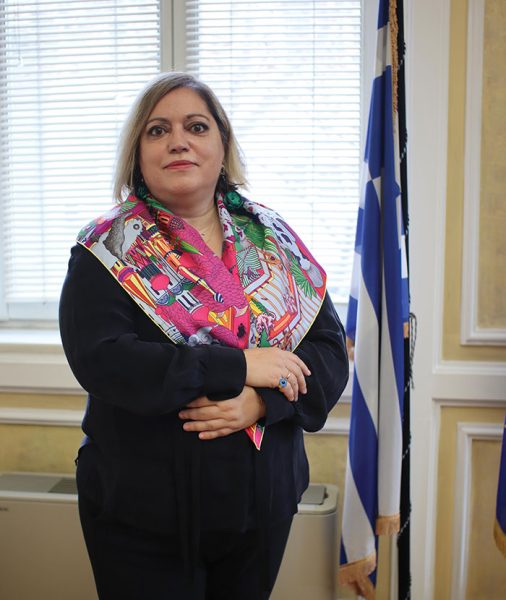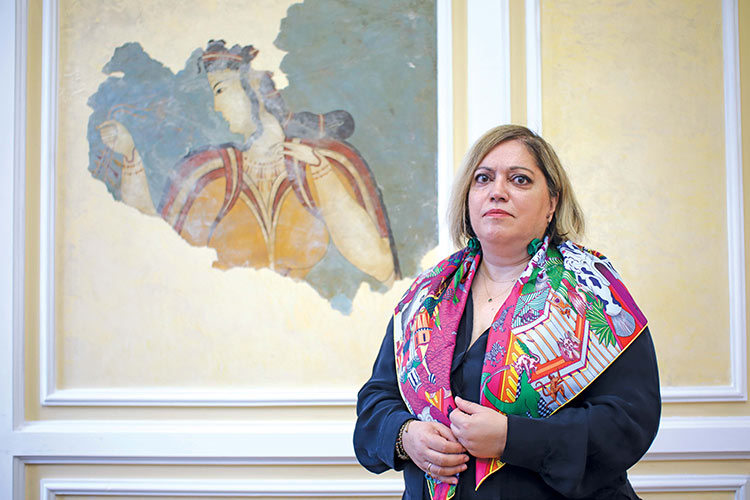Greece’s stance regarding the status of Kosovo remains unchanged, which was reiterated by our Prime Minister during his recent visit to Belgrade. Furthermore, we firmly believe that the EU-facilitated Dialogue between Belgrade and Pristina is the only path that can lead to the normalisation of relations between the two sides. That would also significantly help in terms of the stability of the region, which is the goal for all of us ~ Maria Levanti
The lasting friendship and excellent bilateral relations between Greece and Serbia are a common feature of every discussion about the two nations. The latest focus of those relations on strengthening economic cooperation, particularly in the domain of infrastructure, as discussed during the recent visit of the Prime Minister of Greece to Belgrade, provides hope of the realisation of the decades-long dream of the citizens of Serbia to quickly reach their favourite country in the neighbourhood via a new high-speed railway.
“Serbia and Greece are also discussing a joint project for the completion of the high-speed railway that will extend from Budapest to Athens, which includes the Greek part from Thessaloniki to the border with North Macedonia. This project will not only emphasise European Rail Corridor 10 as one of the most important rail corridors, but will also facilitate the transport of goods and passengers and quickly connect Serbia with the Greek ports of Piraeus and Thessaloniki”, says ambassador Maria Levanti in this CorD Magazine interview.

Your Excellency, what are the key messages of the visit of Prime Minister Kyriakos Mitsotakis to Serbia?
— First of all, I would like to note that the visit of our prime minister unfolded, as always, in a particularly friendly atmosphere and that we are very satisfied about that.
During his visit, Prime Minister Mitsotakis stressed our country’s strong support to Serbia’s EU accession path, underlining that Greece has been the most solid ally of Serbia in this process through the years and that it continues to be. Since 2003 and the Thessaloniki Declaration, the accession of the Western Balkan countries to the European Union has been our strategic goal. Furthermore, Prime Minister Mitsotakis conveyed the readiness of the Greek side to help in preparing for the EXPO 2027, as well as for future infrastructure projects. Greece is more than willing to further boost bilateral economic ties and is particularly interested in cooperation in the fields of transport and energy, among others.
It has been reported in the local media that part of the visit would focus on the interest of Greek companies in participating in the specialised Expo 2027 exhibition to be held in Belgrade. In which direction does their interest lean?
— A number of our largest companies are ready to get involved in EXPO 2027 and other big infrastructure projects, in collaboration with local companies, and to share with them their knowhow, specialised personnel and experience in projects of this size, which involve – in addition to the Exhibition Complex – the construction of basic infrastructure (water supply, waste management, energy, heating/cooling) and transportation (road and rail) in the area of the Expo. Other areas of interest include the construction and management of hotels, real estate, renewable energy sources, tourism and food processing.
Since your late 2022 arrival in Serbia, almost every interview you’ve had with journalists has included a question over whether Greece will maintain its stance on Kosovo, as one of the five EU member states that have not recognised its independence.
— As you know, the stance of Greece regarding the status of Kosovo remains unchanged, which is something that was reiterated by our Prime Minister during his recent visit to Belgrade.
A number of our largest companies are ready to get involved in EXPO 2027 and other big infrastructure projects, in collaboration with local companies, and to share with them their knowhow, specialised personnel and experience in projects of this size
Furthermore, we firmly believe that the EU-facilitated Dialogue between Belgrade and Pristina is the only path that can lead to the normalisation of relations between the two sides. That would also significantly help safeguard stability in the region, which is the goal for all of us.
One of the focuses of your mandate in Serbia is the economy. You’ve stated that it’s time to renew the strengthening of economic cooperation based on the Joint Declaration for the Establishment of a Strategic Partnership between Greece and Serbia, signed in December 2019. This agreement highlights the potential in the fields of the economy, energy, technology and connectivity. Are you already taking steps in that direction?
— The Joint Declaration for the Establishment of a Strategic Partnership between Greece and Serbia was signed in 2019 in the context of the 3rd High Level Cooperation Council (SCC), which was itself established in 2017. Three meetings have since been held: in Thessaloniki (13.07.2017), Belgrade (21.12.2018) and Athens (11.12.2019). Since 2019, the Covid-19 crisis and the Ukraine war, and their impact on the global economy and energy market, have slowed down the process, but now is a good time to again join forces to enhance cooperation between our two countries.

During his recent visit, Prime Minister Mitsotakis came to Belgrade accompanied by four ministers – Infrastructure and Transport Minister Christos Staikouras, Environment and Energy Minister Theodoros Skylakakis Development Minister Kostas Skrekas and Deputy Foreign Minister Kostas Fragogiannis, Responsible for Economic Diplomacy – as well as a large number of representatives of the Greek business community, in order for Serbia and Greece to improve their economic cooperation in specific sectors and projects, especially in the fields of infrastructure, energy and transport – as subjects that were discussed thoroughly during this visit.
As it was announced, the convening of the 4th High Level Cooperation Council is of particular importance when it comes to promoting strategic cooperation between the two countries.
Greece and Serbia recently became connected via a gas interconnector that enables the flow of gas supplied from Azerbaijan and other sources. To what extent does this new link influence economic relations between our two countries?
— Greece is turning into an energy hub, especially with regard to the distribution of natural gas, not only to cover our country’s needs, but also to provide a secure diversified supply route of natural gas for the Balkans and Central Europe. So, in that respect, our bilateral cooperation in this field is becoming very important.
Following completion of the Natural Gas Interconnector (IBS) with Bulgaria, Serbia gained access to natural gas supplies through the Caspian region and Azerbaijan, as well as the LNG terminal at the Greek port of Alexandroupolis, which means that Greece is turning into an important partner of Serbia in the supply of natural gas. Serbia has already reserved 300 million cubic metres of natural gas annually from the LNG terminal at Alexandroupolis.
Plans are also underway between Greek operator DESFA and North Macedonia’s NER JSC Skopje to build a new natural gas pipeline, with an annual capacity of 1.5 bcm and an option to increase that capacity to 3 bcm. This investment could further enhance Serbia’s ability to acquire gas from different sources, once a Serbia-North Macedonia Interconnector is established. I would like to note at this point that, apart from the Revithoussa Island and Alexandroupolis LNG terminals, three more LNG terminals are planned for construction in Greece.
Serbia and Greece are discussing a joint project for the completion of the high-speed railway that will extend from Budapest to Athens, which includes the Greek part from Thessaloniki to the border with North Macedonia
Greece could not only supply Serbia with natural gas, but could also help the country in its transition away from fossil fuels to clean energy. Greek companies have vast experience and knowhow in the fields of energy transition and renewable energy. Greece is ready to support Serbia’s energy diversification.
Energy Diversification is a major pillar in achieving regional prosperity and security. Following completion of the aforementioned projects, our countries will be able to diversify their sources of natural gas significantly.
Will the dream of citizens of both countries to travel from Belgrade to Thessaloniki by high-speed rail be realised and, if so, when? Why is there a delay in implementing this project that has been discussed for over a decade?
— I would like to stress the fact that, before the outbreak of the Covid-19 pandemic, we had passenger and cargo rail traffic between Greece and North Macedonia, and hence onwards to Serbia. To date, only the cargo rail connection has remained operational.
The new high-speed electrified passenger train from Athens to Thessaloniki was launched in 2022, following the reconstruction of the old route. Serbia and Greece are also discussing a joint project for the completion of the high-speed railway that will extend from Budapest to Athens, which includes the Greek part from Thessaloniki to the border with North Macedonia. This project will not only highlight European Rail Corridor 10 as one of the most important rail corridors, but will also facilitate the transport of goods and passengers, and the swift connecting of Serbia with the Greek ports of Piraeus and Thessaloniki.
| COOPERATION Greece is more than willing to further boost bilateral economic ties and is particularly interested in cooperation in the fields of transport and energy | ENERGY Greece could not only supply Serbia with natural gas, but could also help the country in its transition away from fossil fuels to clean energy | EU Since 2003 and the Thessaloniki Declaration, the accession of the Western Balkan countries to the European Union has been our strategic goal |
|---|